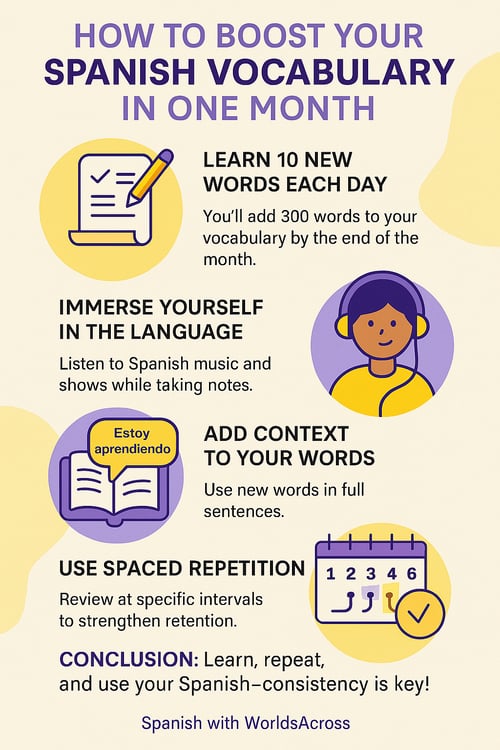How To Increase Your Vocabulary In Spanish In One Month

There are many strategies that can help you reach the much-desired fluency in Spanish. Taking personalized classes, visiting Spanish-speaking countries, or simply expanding your vocabulary are some of the options. Although the latter is highly effective, it can seem like a never-ending task due to the vast number of words in the Spanish language. Don’t worry—we’re here to make it easier!
Below, we share some practical strategies and tips to help you grow your Spanish vocabulary in just 30 days. Let’s get started!
Learn 10 New Words Each Day
Focusing on learning 10 words a day might seem like a small step, but if you stick to it, you’ll add 300 new words to your vocabulary by the end of the month. Not bad at all! This will help you build a stronger foundation, giving you the confidence to communicate in a variety of situations.
Tip: Start with simple words you can use in your everyday life. For example, choose words related to your favorite hobbies. If you enjoy singing, learn words like melodía (melody), tono (tone), and afinación (tuning). When your vocabulary is connected to your interests, you're more likely to remember the words you learn.
Immerse Yourself in the Language
Beyond improving your listening skills and teaching you about Latin American culture, surrounding yourself with the language is one of the best ways to learn new words. How can you do this? We’re not necessarily talking about traveling to Spanish-speaking countries—today, there are plenty of ways to learn Spanish from the comfort of your home.
Tip: Start watching shows and listening to your favorite music genres in Spanish. Don’t just passively watch or listen—write down words you don’t know and make sure to look them up later. That way, you’ll be expanding your Spanish vocabulary in a fun and engaging way.
Add Context to Your Words
What’s the point of learning thousands of words if you don’t know how to use them in full sentences? That’s why it’s essential to use your new words in real-life contexts. For example, if you're learning the word bailar (to dance), imagine signing up for dance classes. Instead of just learning bailar, learn how to say something like “Estoy aprendiendo a bailar salsa” (“I’m learning to dance salsa”). This way, you're not just learning a word—you’re learning how to use it naturally.
Example: If you learn the word español (Spanish), try using it in a sentence like “Cada vez soy mejor hablando español” (“I’m getting better at speaking Spanish every day”). And it would be true—you're doing great!
Use Spaced Repetition
Can you imagine learning a ton of new words only to forget them soon after? Unfortunately, what isn’t reviewed tends to be forgotten. To avoid this, try using spaced repetition—a technique that helps you review learned words at specific intervals to strengthen retention. Here’s a common review schedule for new vocabulary:
- Step 1: Review the word the same day you learn it.
- Step 2: One day later.
- Step 3: Three days later.
- Step 4: Seven days later.
- Step 5: Fourteen days later.
- Step 6: Thirty days later.
Each time you review, the time it takes to forget the word stretches further out. It’s a powerful tool for learning Spanish effectively!

Speak Spanish Every Day
Growing your Spanish vocabulary isn’t just about learning new words—it’s about retaining them. And what better way to do that than by speaking Spanish every day? You don’t need to move to a Spanish-speaking country. You can sign up for personalized Spanish classes, join online language exchanges, or use apps like HelloTalk that let you chat with language learners from around the world.
Tip: You don’t need to spend hours speaking Spanish each day. Try setting small personal goals, like speaking Spanish for 15–20 minutes with other learners or native speakers. Remember, learning Spanish isn’t about how many hours you study—it’s about how consistently you show up. Every step counts!
Conclusion
Boosting your Spanish vocabulary doesn’t have to be stressful or overwhelming. From spaced repetition to daily speaking practice, each of these strategies will help you not only learn new words but also retain them for the long term. Remember, consistency is key! Learn, repeat, and use your Spanish—and you’ll be amazed at how much you can achieve in just 30 days. You’ve got this!




